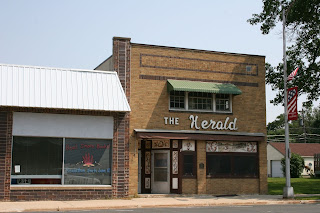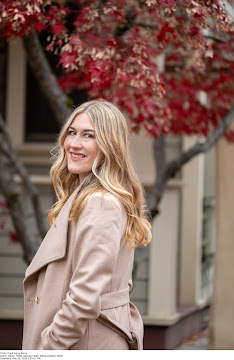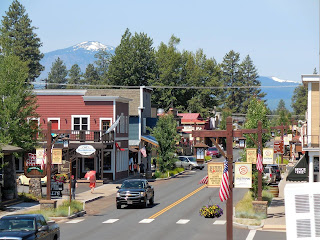The small Oregon town of Pear Blossom welcomes the return of its
prodigal daughter Ruby McKee. Found abandoned as a baby by the McKee family,
Ruby is the unofficial town mascot, but when she and her adoptive sisters start
investigating the true circumstances around her discovery, it soon becomes
clear that this small town is hiding the biggest, and darkest, of secrets. A
raw, powerful exploration of the lengths people go to protect their loved ones,
for fans of Lori Wilde and Carolyn Brown.
Ruby McKee is a miracle.
It’s a miracle she
survived, abandoned as a newborn baby. A miracle that she was found by the
McKee sisters. Her discovery allowed the community of Pear Blossom, Oregon,
broken by a devastating crime, to heal. Since then, Ruby has lived a charmed life.
But she can’t let go of the need to know why she was abandoned, and she’s tired
of not having answers.
Dahlia McKee knows it’s
not right to resent Ruby for being special. But uncovering the truth about
sister Ruby’s origins could allow Dahlia to carve her own place in Pear Blossom
history… if she’s brave enough to follow her heart.
Widowed sister Lydia
McKee doesn’t have time for Ruby’s what
if’s – when Lydia’s right now is
so, so hard. Her husband’s best friend Chase might be offering to share some of
the load, but can Lydia ever trust her instincts around him?
Marianne Martin is glad
that her youngest sister is back in town, but balancing Ruby’s crusade with the
way her own life is imploding is turning into a bigger chore than she imagined.
Especially when Ruby starts overturning secrets about the past that Marianne
has spent a lifetime trying to pretend don’t exist.
And when the truth about
Ruby’s miraculous origins, and the crime from long ago, turn out to be
connected in ways no one could have expected, will the McKee sisters band
together, or fall apart?
Maisey
Yates is a New York Times bestselling author
of over one hundred romance novels. Whether she's writing strong, hard working
cowboys, dissolute princes or multigenerational family stories, she loves
getting lost in fictional worlds. An avid knitter with a dangerous yarn
addiction and an aversion to housework, Maisey lives with her husband and three
kids in rural Oregon. Check out her website, maiseyyates.com or find her on
Facebook.
 |
| Newspaper Office |
Author
Website: http://www.maiseyyates.com/
Facebook: Maisey
Yates
Twitter: @maiseyyates
Instagram: @MaiseyYates
 |
| Historical Society |
The Lost and Found Girl by Maisey Yates is a tale about four sisters living in Pear Blossom, Oregon. I thought the characters were developed as well as realistic and relatable. The author’s vivid descriptions allowed me to envision the characters and the quaint town. As with any family especially when there are sisters, there is drama and secrets. There is also love and strong bonds. As the story unfolds, we get to learn about the women. Their hopes, dreams, heartaches, fears, and relationships. Each one of them puts on a brave face to prevent the others from looking too deep. The sisters reconnect and begin to share more of their lives. The Lost and Found Girl is an emotional novel. There is a mystery as well. Ruby was left on the covered bridge on a cold December night shortly after her birth. She would like to know the identity of her birth mother and why she abandoned her. Ruby’s quest for the truth will bring some dark secrets to light. There is a missing girl as well. She was walking home from her boyfriend’s house, but she never made it to her destination. The teenager disappeared shortly before Ruby’s birth. I believe the reveal will shock some readers. The Lost and Found Girl is about self-discovery, family, friendships, mistakes made, growth, a touch of romance, and forgiveness. The main theme of the story is that a person should not be defined by their circumstances (such as being left on a bridge as an infant and surviving the bitterly cold weather). We can each author our own story. I thought this was a good life lesson and one I wish I had learned when I was younger. The point-of-view switched between the sisters which allows the reader to understand each sister (what they are feeling and thinking). There is romance in the story as well. Each sister gets a chance at love. Those who love women’s fiction will enjoy this poignant tale. The Lost and Found Girl has family drama, romance, mystery, four sisters, caring parents, and a charming small town.
Ruby
Only two truly remarkable things had ever happened in the
small town of Pear Blossom, Oregon. The first occurred in 1999, when Caitlin
Groves disappeared one fall evening on her way home from her boyfriend’s family
orchard.
The second was in 2000, when newborn Ruby McKee was
discovered on Sentinel Bridge, the day before Christmas Eve.
It wasn’t as if Pear Blossom hadn’t had excitement before
then. There was the introduction of pear orchards—an event which ultimately
determined the town’s name—in the late 1800s. Outlaws who lay in wait to rob
the mail coaches, and wolves and mountain lions who made meals of the farmers’
animals. The introduction of the railroad, electricity and a particularly
active society of suffragettes, when women were lobbying for the right to vote.
But all of that blended into the broader context of history,
not entirely dissimilar to the goings-on of every town in every part of the
world, as men fought to tame a wild land and the land rose up and fought back.
Caitlin’s disappearance and Ruby’s appearance felt both specific
and personal, and had scarred and healed—if Ruby took the proclamations of
various citizens too literally, which she really tried not to do—the community.
Mostly, as Ruby got out of the car she’d hired at the
airport and stood in front of Sentinel Bridge with a suitcase in one hand, she
marveled at how idyllic and the same it all seemed.
The bridge itself was battered from the years. The wood dark
and marred, but sturdy as ever. A white circle with a white 1917, denoting the
year of its construction, was stenciled in the top center of the bridge, just
above the tunnel that led to the other side, a pinhole of light visible in the
darkness across the way.
It was only open to foot traffic now, with a road curving
wide around it and carrying cars to the other side a different way. For years,
Sentinel Bridge was closed, and it wasn’t until a community outreach and
education effort in the mid nineties that it was reopened for people to walk
on.
Ruby could have had the driver take her a different route.
But she wanted to cross the bridge.
“Are you sure you want me to leave you here?” her driver
asked.
She’d told him when she’d gotten into his car that she was
from here originally, and he’d still spent the drive explaining local
landmarks to her, so she wasn’t all that surprised he didn’t trust her
directive to leave her in the middle of nowhere.
He was the kind of man who just knew best.
They’d just driven through the town proper. All brick—red
and white and yellow—the sidewalks lined with trees whose leaves matched as
early fall took hold. It was early, and the town had still been sleepy, most of
the shops closed. There had been a runner or two out, an older man—Tom
Swenson—walking his dog. But otherwise it had been empty. Still, it bore more
marks of civilization than where they stood now.
The bridge was nearly engulfed in trees, some of which were
evergreen, others beginning to show rusted hints of autumn around the edges. A
golden shaft of light cut over the treetops, bathing the front of the bridge in
a warm glow, illuminating the long wooden walk—where the road ended—that led
to the covered portion, but shrouding the entrance in darkness.
She could see what the man in the car saw. Something
abandoned and eerie and disquieting.
But Ruby only saw the road home.
“It’s fine,” she said.
She did not explain that her parents’ farm was just up the
road, and she walked this way all the time.
That it was only a quarter of a mile from where she’d been
found as a baby.
She had to cross the bridge nearly every day when she was in
town, so she didn’t always think of it. But some days, days like this after
she’d been away awhile, she had a strange, hushed feeling in her heart, like
she was about to pay homage at a grave.
“If you’re sure.” His tone clearly said she shouldn’t be,
but he still took her easy wave as his invitation to go.
Ruby turned away from the retreating car and smiled,
wrapping both hands around the handle of her battered brown suitcase. It wasn’t
weathered from her own use. She’d picked it up at a charity shop in York,
England, because she’d thought it had a good aesthetic and it was just small
enough to be a carry-on, but wasn’t like one of those black wheeled things that
everyone else had.
She’d cursed while she’d lugged it through Heathrow and
Newark and Denver, then finally Medford. Those wheely bags that were not unique
at all had seemed more attractive each time her shoulders and arms throbbed
from carrying the very lovely suitcase.
Ruby’s love of history was oftentimes not practical.
But it didn’t matter now. The ache in her arms had faded and
she was nearly home.
Her parents would have come to pick her up from the airport
but Ruby had swapped her flight in Denver to an earlier one so she didn’t have
to hang around for half the day. It had just meant getting up and rushing out
of the airport adjacent hotel she’d stayed in for only a couple of hours. Her
Newark flight had gotten in at eleven thirty the night before and by the time
she’d collected her bags, gotten to the hotel and stumbled into bed, it had
been nearly one in the morning.
Then she’d been up again at three for the five o’clock
flight into Medford, which had set her back on the ground around the time she’d
taken off. Which had made her feel gritty and exhausted and wholly uncertain of
the time. She’d passed through so many time zones nothing felt real.
She waved the driver off and took the first step forward.
She paused at the entry to the bridge. She looked back over her shoulder at the
bright sunshine around her and then took a step forward into the darkness.
Light came up through the cracks between the wood on the ground and the walls.
At the center of the bridge, there were two windows with no glass that looked
out over the river below. It was by those windows that she’d been found.
She walked briskly through the bridge and then stopped. In
spite of herself. She often walked on this bridge and never felt a thing. She
rarely felt inclined to ponder the night that she was found. If she got
ridiculous about that too often, then she would never get anything done. After
all, she had to cross this bridge to get home.
But she was moving back to town, not just returning for a
visit, and it felt right to mark the occasion with a stop at the place of her
salvation. She paused for a moment, right at the spot between the two openings
that looked out on the water.
She had been placed just there. Down on the ground. Wrapped
in a blanket, but still so desperately tiny and alone.
She had always thought about the moment when her sisters
had picked her up and brought her back to their parents. It was the moment that
came before that she had a hard time with. The one where someone—it had to have
been her birth mother—had set her down there, leaving her to fate. To die if
she died, or live if she was found. And thankfully she’d been found, but there
had been no way for the person who had set her there to know that would happen.
It had gotten below freezing that night.
If Marianne, Lydia and Dahlia hadn’t come walking through
from the Christmas play rehearsal, then…
The
Avid Reader
*This post contains affiliate links. As an Amazon Associate, I earn from qualifying purchases.

















No comments:
Post a Comment